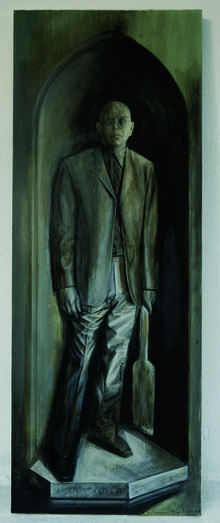Dimitris Lyacos
| Dimitris Lyacos | |
|---|---|
 photo: Katerina Fougiatzi | |
| Born |
October 19, 1966 Athens, Greece |
| Occupation | Poet, playwright |
| Nationality | Greek/Italian |
| Period | Contemporary |
| Genre | Cross-genre |
| Literary movement | World Literature, Postmodern literature |
| Notable works | Z213: Exit (2009) |
| Website | |
|
www | |
Dimitris Lyacos (Greek: Δημήτρης Λυάκος; born October 19, 1966) is a contemporary Greek poet and playwright.[1] He is the author of the Poena Damni trilogy. Renowned for its genre-defying form and the avant-garde combination of themes from literary tradition with elements from ritual, religion, philosophy and anthropology, Lyacos’s work reexamines grand narratives in the context of some of the enduring motifs of the Western Canon.[2] Despite its size - the overall trilogy counts no more than two hundred pages - Poena Damni took over a period of thirty years to complete,[3][4][5] with the individual books revised and republished in different editions during this period and arranged around a cluster of concepts including the scapegoat, the quest, the return of the dead, redemption, physical suffering, mental illness. Lyacos’s characters are always at a distance from society as such,[6] fugitives, like the narrator of Z213: Exit, outcasts in a dystopian hinterland like the characters in With the People from the Bridge, or marooned, like the protagonist of The First Death whose struggle for survival unfolds on a desert-like island. Poena Damni has been construed as an "allegory of unhappiness" together with works of authors such as Gabriel Garcia Marquez and Thomas Pynchon[7] while being considered, at the same time, a major exponent of the postmodern sublime[8] and one of the most important anti-utopian works of the 21st century.[9]
Life
Lyacos was born and raised in Athens where he studied Law. From 1988-1991 he lived in Venice. In 1992 he moved to London. He studied philosophy at University College London[10] with analytical philosophers Ted Honderich and Tim Crane focusing on Epistemology and Metaphysics, Ancient Greek philosophy and Wittgenstein. In 2005 he moved to Berlin. He is currently based in Berlin and Athens.
Career
In 1992, Lyacos set about writing a trilogy under the collective name Poena Damni, referring to the hardest trial the condemned souls in Hell have to endure, i.e. the loss of the vision of God. The trilogy has developed gradually as a work in progress in the course of thirty years.[11] The third part (The First Death) appeared first in Greek (Ο πρώτος θάνατος) and was later translated in English, Spanish and German. The second part under the title "Nyctivoe" was initially published in 2001 in Greek and German and came out in English in 2005. This work was substituted in 2014 by a new version under the title With the People from the Bridge.[12]

Various artists have brought Lyacos' work in different artistic media. Austrian artist Sylvie Proidl, presented a series of paintings in 2002 in Vienna. In 2004, a sound and sculpture installation by sculptor Fritz Unegg and BBC producer Piers Burton-Page went on a European tour. In 2005 Austrian visual artist Gudrun Bielz presented a video-art work inspired by Nyctivoe. The Myia dance company performed a contemporary dance version of Nyctivoe in Greece from 2006 to 2009. A music/theatre version of Z213: Exit by Greek composers Maria Aloupi and Andreas Diktyopoulos, performed by Das Neue Ensemble and Greek actor Dimitris Lignadis was presented in 2013.[13]
Dimitris Lyacos was Guest International Poet with Les Murray in 1998 Poetryfest International Poetry Festival, Aberystwyth, Wales. Henceforth he has conducted readings and has lectured on his work at various Universities worldwide, including Oxford, Trieste, Hong Kong and Nottingham. In 2012 he was Writer in Residence at the International Writing Program, University of Iowa.[14] He is one of the most recent Greek authors to have achieved international recognition,[15][16][17] Poena Damni being the most widely reviewed Greek literary work of the recent decades[18] and Z213: Exit, arguably, the best-selling book of contemporary Greek poetry in English translation.[19][20] Lyacos was guest author at the 2017 International Literature Festival of Tbilisi.[21]
Poena Damni
Summary/Context
The trilogy would appear to belong to a context of tragic poetry and epic drama, albeit distinctly postmodern[22] at the same time. It explores the deep structure of tragedy instead of its formal characteristics, having thus been called a post-tragic work.[23] Homer, Aeschylus[24] and Dante[25] as well as the darker aspects of romantic poetry together with symbolism, expressionism,[26] and an intense religious and philosophical interest permeate the work. Poena Damni has thus been related, despite its postmodern traits, more to the High Modernist tradition of James Joyce[27] and Virginia Woolf[28] The first of the three pieces, Z213: Exit (Z213: ΕΞΟΔΟΣ), accounts a man's escape from a guarded city and his journey through dreamlike, sometimes nightmarish, lands.[29] In the second book, With the People from the Bridge (Με τους ανθρωπους απο τη γεφυρα) the protagonist of Z213: Exit becomes a first-degree Narrator appearing as one spectator in a makeshift play performed under the arches of a derelict train station. The third book, The First Death (Ο Πρώτος Θάνατος) opens with a marooned man on a rocky island and details his struggle for survival as well as the disintegration of his body and the unrolling of its memory banks.[30]
Survey

The work is hard to classify since it crosses the usual boundaries of genre.[31] Z213: Exit re-contextualizes elements from the greater Greek canon — including the escaped hero and the devote wanderer.[32] It often takes narrative form, mixing poetry and prose,.[33] The trilogy moves into dramatic representation of character and situation in With the People from the Bridge, and subsequently to a hard lyrical kind of poetry used to depict the break-up and eventual apotheosis of the body in The First Death. The possibilities of divergence between the perceived and the objective outside world are exploited; the reader follows the irregular flow of internal monologues stemming from events in the external world but ultimately viewed as reflected onto the thinking and feeling surfaces of the protagonist's mind. On the other hand, an alien setting and the unfolding, dreamlike occurences are presented with impressive solidity,[34] pointing to an alternative reality, or, unveiling a hidden dimension of the world. From that perspective, the work has been interpreted as a kind of surfiction[35] whereby the world depicted within the trilogy allows an open space for the reader to contribute his own internalized version.[36]
Z213: EXIT
Z213: Exit uses the device of the palimpsest to present a fictional tissue combining elements of both ancient and modern sources as well as the "dialogue" of its two protagonists.[37] It is composed of a series of fragmented entries[38] in a fictional diary recording the experiences of an unnamed protagonist during a train journey into an unknown land.[39] The man has been released - or escaped - from some time of confinement elliptically described in his journal[40] and reminiscent of a hospital, prison, ghetto or enclave of some sort.[41] His subsequent wanderings among desolate landscapes on the verge of reality are set in a closely detailed, and somehow Kafkaesque,[42] atmosphere, undercutting the point that the most dreamlike occurrences are also the realest.[43][44] Along the way, the protagonist delves deeper in what seems like a quasi-religious quest while, at the same time, his growing impression of being stalked[45] introduces an element of suspense and a film noir-like quality. Thus, the text hinges on the metaphysical but is also reminiscent of an L.A. private eye in a 1940s detective novel closing upon an extraordinary discovery. Z213: Exit ends with a description of a sacrifice where the protagonist and a "hungry band feasting" roast a lamb on a spit, cutting and skinning its still bleating body and removing its entrails as if observing a sacred rite.[46]
With the People from the Bridge
With the People from the Bridge hinges on the story of a character resembling the Gerasene demoniac from St. Mark's gospel, living in a cemetery, tormented by demons, and cutting himself with stones. He enters the tomb of his dead lover attempting to open the coffin in which she seems to lie in a state not affected by decomposition and the urgency of his desire reanimates her body whose passage back to life is described.[47] The grave becomes a "fine and private place" for lovers still capable of embracing.[48]
The play recounts in a multiperspectival narrative a story based on the theme of the revenant through the first-person embedded accounts of four characters: a man possessed by demons attempts to resurrect the body of his lover but ends in joining her in the grave.[49] The action is enveloped in a context reminiscent of a festival for the dead as well as that of a vampire epidemic. There are clear references to Christian tradition and eschatology and the piece results in a joint contemplation of collective salvation which is ultimately left unresolved after a final narrative twist.[50]
The First Death
In The First Death a place is denied to the mutilated body which grinds against the rocks and suffers continuing degradation, physical and mental, as even the mechanisms of memory are dislocated.[51] Yet the bond between person and body that ensures life still persists, and, "at that point without substance/ where the world collides and takes off",[52] the mechanical instincts of the cosmos rumble into action and sling this irreducible substance again into space - prompting, perhaps, a future regeneration.
Further reading
A special feature on Dimitris Lyacos's trilogy on the Bitter Oleander Magazine[53] including extensive excerpts and a long interview with the author:
- http://www.bitteroleander.com/editor.html
- Overview of the Poena Damni trilogy in Cleaver Magazine:
http://www.cleavermagazine.com/poena-damni-trilogy-by-dimitris-lyacos-reviewed-by-justin-goodman/
- John Taylor interviews Dimitris Lyacos. New Walk, Issue 12, Spring/Summer 2016, Leicester UK.
Bibliography
- Poena Damni O Protos Thanatos. Odos Panos. Athens. 1996. ISBN 960-7165-98-5
- Poena Damni The First Death. English edition. Translated by Shorsha Sullivan. Shoestring Press. 2000. ISBN 1-899549-42-0
- Poena Damni Nyctivoe. Greek - German edition. Translated by Nina-Maria Jaklitsch. CTL Presse. Hamburg. 2001.[54]
- Poena Damni Nyctivoe. English edition. Translated by Shorsha Sullivan. Shoestring Press. 2005. ISBN 1-904886-11-6
- Poena Damni Z213: ΕΞΟΔΟΣ. Greek Edition. Dardanos Publishers, Athens 2009. ISBN 960-402-356-X
- Poena Damni Z213: Exit. English edition. Translated by Shorsha Sullivan. Shoestring Press 2010. ISBN 978-1-907356-05-6
- Poena Damni Der erste Tod. German edition. Translated by Nina-Maria Wanek. Verlagshaus J. Frank. First edition 2008. Second edition 2014. ISBN 978-3-940249-85-2
- Poena Damni With the People from the Bridge. Translated by Shorsha Sullivan. Shoestring Press, Nottingham 2014. ISBN 978 1 910323 15 1
- Poena Damni Z213: Exit, Second Edition (Revised). Translated by Shorsha Sullivan. Shoestring Press, Nottingham 2016. ISBN 9781910323625
References
- ↑ http://www.mid.muohio.edu/segue/7/7lyacos.pdf
- ↑ World Literature Today, Notabenes Section, March 2017. https://www.worldliteraturetoday.org/2017/march/nota-benes-march-2017
- ↑ World Literature Today, Notabenes Section, March 2017. https://www.worldliteraturetoday.org/2017/march/nota-benes-march-2017
- ↑ Paul B. Roth, Preface to Dimitris Lyacos, Special Feature, The Bitter Oleander Journal. The Bitter Oleander Journal, Volume 22, No 1, Spring 2016, Fayetteville, NY.
- ↑ Bethany W. Pope, With the people from the bridge: Poena Damni, The Ofi Press Magazine, Issue 44, October 2015, Mexico City, Mexico. http://www.ofipress.com/lyacosdimitris.htm
- ↑ Michael O'Sullivan. The Precarious Destitute: A Possible Commentary on the Lives of Unwanted Immigrants http://www.asiancha.com/content/view/2105/505/
- ↑ Williams, Mukesh. Representations of Self-Actualizing Women in Haruki Murakami and Leo Tolstoy. Studies in the English Language & Literature No. 77 2015 [p. 34]. http://libir.soka.ac.jp/dspace/bitstream/10911/4568/1/ebk401-029.pdf
- ↑ Philip Shaw, The Sublime. Chapter: The Sublime is Now, p. 176. Routledge 2017. https://books.google.gr/books?id=XA-9DgAAQBAJ&pg=PT206&lpg=PT206&dq=dimitris+lyacos+postmodern&source=bl&ots=_tMteVbd0Y&sig=18IjAjY8pYa2bDDutlWCO5cZKvs&hl=en&sa=X&ved=0ahUKEwj7teHY68bTAhWCfhoKHaD1BG8Q6AEIWjAJ#v=onepage&q&f=false
- ↑ Toby Widdicombe, Andrea Kross. Historical Dictionary of Utopianism, p. xxxi. 2017, Rowman and Littlefield.https://books.google.gr/books?id=LQolDwAAQBAJ&pg=PR31&lpg=PR31&dq=%22Z213:+Exit%22&source=bl&ots=ICwJlpQG4e&sig=ujnqcbehQ_jshx8tQHzcnrhF6HY&hl=en&sa=X&ved=0ahUKEwj-l-vG66jUAhUEbRQKHVFOCAc4MhDoAQgiMAE#v=onepage&q&f=false
- ↑ https://www.ucl.ac.uk/philosophy/prospective-students/careers-destinations
- ↑ Paul B. Roth, Preface to Dimitris Lyacos, Bitter Oleander Journal Feature. The Bitter Oleander Journal, Volume 22, No 1, Spring 2016, Fayetteville, NY.
- ↑ http://www.shoestring-press.com/2014/10/with-the-people-from-the-bridge/
- ↑ https://soundcloud.com/adiktyopoulos/z213-exit-chapter-8-part-33
- ↑ "Dimitris Lyacos | International Writing Program". Iwp.uiowa.edu. 2013-07-17. Retrieved 2013-07-27.
- ↑ A review of Z213: Exit. Mark King. The Literary Nest, Issue 1, April 2017.
- ↑ John Taylor interviews Dimitris Lyacos. New Walk Magazine, Issue 12,Spring/Summer 2016, Leicester UK.
- ↑ Eleni Sakellis, Some works of world-renowned poet Dimitris Lyacos. The National Herald, New York. Feb 20-26 2016, page 9.
- ↑ Robert Zaller, Eucharist: Dimitris Lyacos's "With the People from the Bridge"The Critical Flame, March 2016. http://criticalflame.org/eucharist-dimitris-lyacoss-with-the-people-of-the-bridge/
- ↑ Paul B. Roth, Preface to Dimitris Lyacos, Special Feature, The Bitter Oleander Journal. The Bitter Oleander Journal, Volume 22, No 1, Spring 2016, Fayetteville, NY.
- ↑ http://Levure%5B%5D Litteraire, Issue 12. levurelitteraire.com/dimitris-lyacos/
- ↑ http://tbilisilitfest.ge/EN/index.php?do=full&id=5427
- ↑ Poena Damni trilogy. Review by Justin Goodman. Cleaver Magazine, 2015. http://www.cleavermagazine.com/poena-damni-trilogy-by-dimitris-lyacos-reviewed-by-justin-goodman/
- ↑ Ilias Bistolas, Poena Damni - Z213: Exit. Southern Pacific Review, January 2017.http://southernpacificreview.com/2017/01/26/z213-exit/
- ↑ "Verlagshaus J. Frank: Quartheft 08 | Der erste Tod | Dimitris Lyacos". Belletristik-berlin.de. Archived from the original on 2013-07-14. Retrieved 2013-07-27.
- ↑ "Z213: Exit by Dimitris Lyacos". Theadirondackreview.com. Retrieved 2013-07-27.
- ↑ Robert Zaller - Recent Translations from Shoestring Press.The Journal of Modern Greek Studies, Volume 19, 2001/ Johns Hopkins University Press.
- ↑ A review of Dimtiris Lyacos's With the People from the Bridge Katie Bodendorfer Garner. The Packingtown Review, May 2016, Chicago .http://www.packingtownreview.com/issues/7/katiebodendorfergarner/review.html#.V1f0yLQsxLE
- ↑ Joseph Labernik. From the Ruins of Europe: Lyacos's Debt-Riddled Greece. http://www.tikkun.org/nextgen/from-the-ruins-of-europe-lyacoss-debt-riddled-greece
- ↑ "A Review of "Poena Damni, Z213: EXIT" by Dimitris Lyacos, Translated by Shorsha Sullivan «". Decompmagazine.com. 2011-07-17. Retrieved 2013-07-27.
- ↑ "Project MUSE - Robert Zaller. Recent Translations from Shoestring Press". Muse.jhu.edu. doi:10.1353/mgs.2001.0026. Retrieved 2013-07-27.
- ↑ "mediterranean poetry » Dimitris Lyacos". Mediterranean.nu. Retrieved 2013-07-27.
- ↑ Review of Z213: Exit. Will Carter, Ezra Journal of Translation, vol. 12, Spring 2017.
- ↑ g emil reutter, Z213: Exit, North of Oxford. https://northofoxford.wordpress.com/2017/02/03/z213-exit-poena-damni/
- ↑ Z213: Exit by Dimitris Lyacos (Second Edition). Review by Max Goodwin Brown. Prick of the Spindle Journal, April 2017. Alabama, USA.http://prickofthespindle.org/2017/04/09/z213-exit-by-dimitris-lyacos/
- ↑ http://archives.evergreen.edu/webpages/curricular/2007-2008/monstrouspossibility_wiki/index-38812.php.html
- ↑ Fran Mason, Historical Dictionary of postmodern Literature and Theater, Dimitris Lyacos pp. 276-77. Second Edition, Rowman and Littlefield 2016.
- ↑ Review of Z213: Exit. Will Carter, Ezra Journal of Translation, vol. 12, Spring 2017.
- ↑ Nicholas Alexander Hayes. Review of Z213: Exit. Your Impossilbe Voice, February 2017. http://www.yourimpossiblevoice.com/review-z213-exit-poena-damni-dimitris-lyacos/
- ↑ A review of Z213: Exit. Mark King. The Literary Nest, Vol. 3, Issue 1, April 2017.
- ↑ The Missing Slate. Review of Z213: Exit by Jacob Silkstone. March 2017. http://themissingslate.com/2017/03/07/z213-exit/
- ↑ Decomp Magazine. Spencer Dew, Dimitris Lyacos' Z213: Exit. July 2011.
- ↑ "Cha: An Asian Literary Journal - A Philosophy of Exits and Entrances: Dimitris Lyacos's Poena Damni, Z213: Exit". Asiancha.com. Retrieved 2013-07-27.
- ↑ Z213: Exit by Dimitris Lyacos (Second Edition). Review by Max Goodwin Brown. Prick of the Spindle Journal, April 2017. Alabama, USA.http://prickofthespindle.org/2017/04/09/z213-exit-by-dimitris-lyacos/
- ↑ Genna Rivieccio, Z213: Exit. The Opiate Magazine, February 2017. https://theopiatemagazine.com/2017/02/12/poena-damni-z213-exit-by-dimitris-lyacos-gets-worthy-translation-from-shorsha-sullivan/
- ↑ Marie Schutt. Dimitris Lyacos's Z213: Exit, a world gone mad. Liminoid Magazine, February 2017. http://www.liminoidmagazine.com/blog/2017/2/23/review-dmitri-lyacos-z213exit-a-world-gone-mad
- ↑ Cha An Asian Literary Journal, Issue 13, February 2011. Michael O' Sullivan. A philosophy of exits and entrances: Dimitris Lyacos' Poena Damni, Z213 Exit
- ↑ http://www.shoestring-press.com/2014/10/with-the-people-from-the-bridge/
- ↑ Chris Duncan, http://raysroadreview.com/book-review-with-the-people-from-the-bridge/
- ↑ "Lyacos, Nyctivoe Libretto 5". Ctl-presse.de. Retrieved 2013-07-27.
- ↑ Robert Zaller, Eucharist: Dimitris Lyacos's "With the People from the Bridge"The Critical Flame, March 2016. http://criticalflame.org/eucharist-dimitris-lyacoss-with-the-people-of-the-bridge/
- ↑ "NonFiction". The Writing Disorder. Retrieved 2013-07-27.
- ↑ The First Death, Poena Damni, Translated by Shorsha Sullivan, Shoestring Press, Nottingham 2000, page 32.
- ↑ The Bitter Oleander, Volume 22, No 1, Spring 2016, New York. http://www.bitteroleander.com
- ↑ Lyacos, Nyctivoe Libretto 5
External links
| Wikiquote has quotations related to: Dimitris Lyacos |
- Official website
- An interview with the author in The Writing Disorder Magazine http://writingdisorder.com/dimitris-lyacos/
- Sullivan, Shorsha. "Results for 'lyacos'". Worldcat.org. Retrieved 2013-07-27.